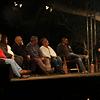Trying to frame this concept in modern language, is like trying to grasp a two dimensional cup out of a piece of paper, it's the layers that make the cup palpable, not the drawing of it. Connection to country is inherent, we are born to it, it is how we identify ourselves, it is our family, our laws, our responsibility, our inheritance and our legacy.
To not know your country causes a painful disconnection, the impact of which is well documented in studies relating to health, wellbeing and life outcomes. Modern constructs of identification do not work for us, in fact they dismantle the fabric that holds us together. For example, it matters not that my licence says that I live in Sydney, it matters that I am guest in this place, I respect it because I am from the Arrente and Luritja lands, and it is this knowledge that enables me to identify who I am, who my family is, who my ancestors were and what my stories are. We are indistinguishable from our country which is why we fight so hard to hang on.
What if I told you I can travel through time and worlds?
What if I told you I can travel through time and worlds? This isn't something that I can control, sometimes I'm here in the present, then without warning I disappear to another place and another time. Sometimes my destination is just a few years ago, sometimes I travel centuries, and at other times, it's as if the past, present and future all overlap at the same time.
Watch the full episode of AWAKEN: Talking Country
Don't believe me? Then come with me now, to an ethereal land where the earth is red and the sky is so blue, that it is clear. There's an old girl with silver hair sitting underneath the shaded canopy of a giant desert oak. The tree's long graceful leaves are whistling a song particular to this country. The sound is ghostly and enigmatic. The old girl's head is bowed, intent on the task in front of her, she's burning seeds that she'll paint and make jewellery with. Each seed takes a minute to burn through. One long leg is stretched out straight in front of her, the other at a right angle.
There is a small fire, in which her irons are heating, the coals have gone grey, they need stoking. On instinct, I reach out and give the coals a push, just like the old girl would have once done for her grandmother. The coals glow orange and emit new warmth. I smile, this has been my job for as a long I can remember, start the fire, stoke the fire, and watch for snakes while you are picking up wood. In the space of just a few moments, we've just travelled centuries through my genealogy.
I love the way that happens in this world, the way tasks overlap with memories. Here words and actions transcend time, I am past, present and future, stoking the fire, gathering wood, and looking for snakes - these simple activities are fundamental to survival out here and have been for tens of thousands of years. The old girl looks up and pats the earth beside her. The movement leaves a handprint in the red sand. I do as I am told, and sit beside her, it will be a nice break from the digging that I've been doing for the new septic pit. In this moment, worlds are overlapping and we're back to present.
As I sit, my brain registers how much I love the feel of the sand beneath me, it is fine and soft, softer than silk,
As I sit, my brain registers how much I love the feel of the sand beneath me, it is fine and soft, softer than silk, and as I adjust my position, it gives way and makes a small mould to cradle my legs. I am so comfortable that I take a deep breath. My lungs fill with air that is so clean you can smell it, then I exhale and everything that bothers me from the present world disappears, no longer relevant, not part of this time. It's hard to describe this experience because it's like the air is part of me and so is everything else and it has always been that way.
The old girl notices and smiles. Despite her age, she has no wrinkles on her brow. She too is happy but her expression is one of pride and accomplishment. "You like this place?" she asks. I nod my head and reach out for one of the irons, I'm going to help her burn the seeds. We've jumped backwards 30 years to my childhood, where we sit with all my Grandmothers around the fire, this is nice because it's the only time I can see them, with the exception of the old girl, they are all gone now.
"I fought for a long time to get this country back"
In answer to my nod, the old girl continues, "I fought for a long time to get this country back", we've travelled even further, perhaps 80 years to a moment when the collision of time and worlds was still new. She doesn't look up, her eyes remain on the task, slow and rhythmical, she is teaching me without lessons, "For you mob, for all of you, my kids and your kids, this is my country, Iltjijari, your country". The word rolls off her tongue, it sounds like the song being sung by the trees. She looks up and continues "Ever since I was a young woman, I've been fighting for this place, me and your Grandfather. I told him I want to go home and live on my country." We've moved forward to the 70's, 1974 to be exact, to the formation of the Luritja Land Association, a landmark body, established two years before the passing of the Northern Territory Land Rights Act and the evolvement of the modern land councils.
She pauses as she reaches for another iron, the one she has been using has cooled and is no longer able to slide through the wood of the seeds. The old girl resettles herself and the sand follows her, remoulding to cradle her position. "Me and the old man, we picked another place. Over there on the other side of the river" she motions with her chin in a direction to the south, but this place is good, you can see for a long way." Her words are innocent and matter fact. We're moving again, to the time of her childhood and her mother Tangawanne's childhood, to the era the old girl calls "rifle times". What she means is that the further away you can see, the more time you have to run and hide from people who will shoot you.
The old girl replaces the iron back into the fire, "But he's gone now, just me now." The time line jumps, it is August 1997, Grandpa has died, he is just of one many people who will die before we can access this country legally. The two worlds sit at odds, there are two laws, both of them are right for the people they serve. For the old girl, only one law is relevant, her own, this is her country, she owns it, sings it, hunts it and cares for it. At the same time she knows that adhering to her laws can hurt her, because the other world does not respect this world. The timeline shimmers, the past remains strong, it's the future that is concerning.
"It's good here" the old girl continues as she places her iron back in the fire, and looks around. "I would just sit down here all the time if I had some company" she chuckles, "Except for maybe payday, I'd like to go to the casino on pay day." Time has overlapped again and our conversation is ancient, present and future. The landscape murmurs.
The landscape murmurs.
I look over the old girl's shoulder, I can see the worlds and time colliding and the weight I'd breathed away returns, I brace for the shockwaves, they come hard and fast. The skills to look after this land exist, our ability to build businesses and economies from this land also exist, but we are bound by legislations particular to land trusts and a form of social poverty that makes knowing how to access help hard. Intuitively we distrust authority, we have many reasons to. The sign that marks our homelands reminds of us such, 'Prescribed Area – No Liquor, Prohibited Material', there will be no wine after dinner, the Federal Government has control of my home.
But a glass of wine is the least of my problems. The old girl keeps getting older and we need her because she is ancient and without her we will no longer be able to travel through time. My skin prickles in fear a fraction of a second before the present and past both come crashing in on another shockwave, if we can't sing the songs and follow the stories this land will get sick. We know this, not from science books written by universities but from 40 thousand years of scientific observation and practice, no other living culture has access to knowledge like this.
Another wave arrives, this one carries the past, present and future, it makes no sound and yet I can hear it screaming, listen to us, listen to me, the new world is swallowing the old world and it has no mercy. I look across the plains, this place that the old girl has chosen so that we can run and I realise that there is nowhere to go. We are stuck, if we do not work, we cannot live, if we work every day, then we cannot sing, if we cannot sing, we will lose our song, if we lose our song, the new world will use its laws and take this land away again and the old girl's fight will have been in vain.
I'm a time traveller who needs to learn how to manage time. Not to watch the worlds collide but to take others with me, to see our world, to touch its power, to feel its fear, share its hopes and stop the crashing impact of the shock waves.
This article was originally published on Daily Life. You can read the original here.

